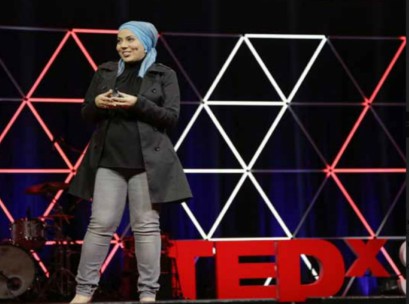 It’s time for Australian businesses to check their privilege and actively hire people from different cultural backgrounds, declared diversity and inclusion consultant Mariam Veiszadeh at TedXSydney last week.
It’s time for Australian businesses to check their privilege and actively hire people from different cultural backgrounds, declared diversity and inclusion consultant Mariam Veiszadeh at TedXSydney last week.
“I’m not asking you to whack photos of people who look like me on your website to tick a box. Real diversity brings about diversity of perspective of views and thoughts,” Veiszadeh told the crowd of more than 4,200 at the International Convention Centre in Darling Harbour.
“Ultimately, the inevitable flow-on effect is that Australian businesses will be able to understand a multicultural Australia that’s ultimately their customer base.”
Veiszadeh fled her homeland of Afghanistan during the Soviet War and arrived in Australia as a refugee with her family in 1991. She is now a lawyer and an inclusion and diversity consultant for several corporate businesses and was named as 2016 Fairfax Daily Life Woman of the Year for her work.
Diversity brings with it a competitive advantage, Veiszadeh said, citing figures from the Diversity Matters report from McKinsey and Company last year. The research revealed that gender diverse companies are 15 per cent more likely to outperform their industry average, while culturally diverse companies are 35 per cent more likely to outperform theirs.
However, businesses need to be aware of the biases and privileges that exist and how they create an unequal playing field, before deciding on what action they can take.
“We all tend to possess a strong tendency to people who physically resembles ourselves. It’s called affinity bias. Experiments have shown us the brain categorises by race in less than 100 milliseconds and hiring decisions are made in the first 10 seconds of a job interview,” explained Veiszadeh.
In 2009, researchers from the Australian National University sent out 4,000 fake applications to businesses for entry-level hospitality, customer service and sales jobs, changing the names of the candidates.
“To attain the same number of interviews as someone with an Anglo name, candidates from Indigenous, Asian, Middle-Eastern sounding names have to submit a ridiculous more amount of applications. Compared to Lisa and Andrew, Nadeen and Hassan have to submit 64 per cent more applications, while Ming and Hong have to submit 68 per cent times more,” she said.
Veiszadeh also believes that the westernised model of leadership and society’s views of merit need to be challenged in order for a more diverse workforce to take place.
“For a really long time, we have assumed that leaders have to look and sound a particular way and anyone that doesn’t fit that stereotype is seen as not having merit or somehow being in that role as a tokenistic gesture,” she told IRW.
“But if you normalise the difference, no-one will bat an eyelid. That person got that job not because they’re female, culturally diverse or have a visible disability – they got that job because they have merit and that’s where we have to challenge the concept of a meritocracy and what that means.”
Earlier this year, a report released by the Australian Human Rights Commission and Deloitte found that businesses are failing to meet the needs of their diverse customer base, missing out on sales and customer loyalty.
One in three of those surveyed from an Indigenous or non-European background or who had a disability, and nearly one in two who identify as gay, lesbian or bisexual or practice a noticeable faith, said their customer needs were often unmet in the past 12 months.
“The issue is that retailers and product designers are not always looking for what works for diverse customers, so it’s that sort of proactive mindset – are our products and services designed for the ‘non-template’ customer or do we really assume basically everybody is kind of the same?” Juliet Bourke, Deloitte Human Capital partner and co-author of the report told IRW.
The research also found that half of the people surveyed who identify as lesbian, gay or bisexual or who practice a noticeable faith, would be more likely to be positively influenced by businesses that openly support a diverse community.





